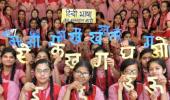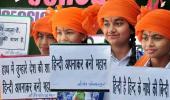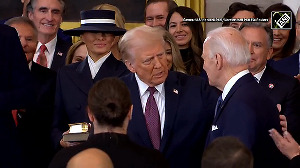Strongly backing Tamil Nadu's decades old two-language policy, the ruling All India Anna Dravida Munnetra Kazhagam in the state on Monday rejected the Centre's three-language formula proposed in the new National Education Policy 2020 and said there will be no deviation from the existing system.

"The three-language formula in the NEP is painful and saddening. The Prime Minister (Narendra Modi) should reconsider the three-language policy," Palaniswami said.
Taking strong exception to the proposal, he said in a statement the state has been following the two-language policy for several decades and that there will be no change in it.
His assertion came amidst opposition demand, including from the Dravid aMunnetra Kazhagam, that the government should reject the three-language formula proposed in NEP and stick to its two-language policy.
Incidentally, ahead of today's meeting he convened to discuss the matter with his senior cabinet colleagues, the Opposition bloc led by DMK wrote to the chief minister, asking him to adopt a Cabinet resolution against the new NEP.
"Tamil Nadu will never allow the Centre's three-language formula. The state will continue with its dual language policy (of Tamil and English)," Palaniswami said.
He discussed the matter with his colleagues -- deputy CM O Panneerselvam, Ministers for higher education and school education, K P Anbalagan and K A Sengottaiyan, respectively and others.
The Centre should allow the states to implement their own policy on the subject, he said, adding there will be no change to the two-language formula which the state had adopted decades ago.
Teaching up to class 5 in mother tongue or regional language and lowering the stakes of board exams are part of the sweeping reforms in the new NEP unveiled last week by the Centre.
However, the proposals have found resistance from the DMK-led opposition in the state, with the Leader of Opposition in the Assembly, MK Stalin, dubbing it as an attempt to "impose" Hindi and Sankrit.
The anti-Hindi movement of the 1960s taken forward by the DMK had struck an instant chord among the Tamil masses then and is believed to be one of the key reasons for the Dravidian party storming to power in the 1967 elections under the late CN Annadurai, unseating a Congress government in the state for the first time in post-independent India.
Palaniswami further said the state has been maintaining a consistent stand and that for about 80 years, the people of Tamil Nadu had been firm on two language policy.
Late chief ministers Annadurai, MG Ramachandran and J Jayalalithaa were firmly against 'imposition' of Hindi.
He also recalled the historic resolution brought in the Tamil Nadu Assembly by late Annadurai on January 23, 1968, which proposed to abolish the three language policy in all schools in the state, removing Hindi from the State syllabus but allowing only Tamil and English.
Later, the AIADMK government led M G Ramachandran had in 1986 adopted an assembly resolution asserting the two language policy.
Former chief minister J Jayalalithaa too was firm on opposing Hindi on non-Hindi speaking states and in thwarting such efforts and wanted Tamil to be declared as an official language of the country, he said.
Palaniswami pointed out he himself had written to the Prime Minister in June 2019 stressing on two-language policy.
Besides, he had reiterated this in his Independence Day address last year and on various occasions during the debates in the state assembly, he recalled.
Meanwhile, the Opposition DMK led alliance in Tamil Nadu -- comprising the Congress, the MDMK, the VCK, the CPM, the CPI and the MMK -- collectively wrote a letter to Palaniswami asking him to pass a resolution against the new NEP in the Tamil Nadu Cabinet meeting.
Many clauses in the new policy are trying to impose "Hindi" and "Sanskrit" and are "trying to do away with Tamil from the system, and this is against federalism, women rights and social justice.
It was also "imposing" vedic culture, besides being mum on reservation, it said.
"The NEP should be opposed in the initial stages itself," the letter added.
Later, Stalin, in a Facebook post, thanked Palaniswami for the government stand on the matter.
The NEP, passed by the Union Cabinet last week, laid emphasis on the mother tongue/local and regional language which will now be the medium of instruction at least till Class 5, but preferably till Class 8 and beyond.
Also, Sanskrit will be offered at all levels of school and higher education as an option for students, including in the three-language formula.











 © 2025
© 2025